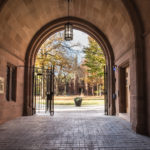Some years ago, I visited the Grande Chartreuse, the mother house of the Carthusian monks, which is nestled in the Alps outside of Grenoble, France. After passing through a long cow pasture, all at once I saw the monastery, with soaring peaks on either side of it. Visitors are not allowed to enter the monastery, but a sign invited guests to a small chapel inside the rock of the outer wall. It told me that God was waiting for me to come and meet him within. I had only to enter, and I would find him in the silence.
I thought back to that hollowed-out chapel and its small sign as I read Zena Hitz’s Lost in Thought: The Hidden Pleasures of an Intellectual Life. Hitz, a tutor at St. John’s College in Annapolis, has written a similarly winsome invitation to the beauty of silence and the interior life. The problem at the heart of the crisis of the humanities is “largely a matter of affect and with it a failure of imagination,” she argues. Academics have lost touch with what ordinary human intellectual activity is really about, and they can no longer justify why the institutions devoted to that activity really matter.
The solution is to remember that the intellectual life is an important human good. It should be pursued for its own sake, not as a means to civic participation, cultural memory, social justice, or economic productivity, as important as each of those is.
The intellectual life is an important human good. It should be pursued for its own sake, not as a means to civic participation, cultural memory, social justice, or economic productivity, as important as each of those is.
A Problem of the Soul
Start your day with Public Discourse
Sign up and get our daily essays sent straight to your inbox.The book has a religious structure, though it is addressed to all humanistic inquirers irrespective of religious conviction. Hitz thinks that the problem with modern education is one of the soul, a matter of bad ideas but even more a matter of misplaced loves. She quietly indicts the corruptions common to the life of the mind and proposes a right understanding of intellectual inquiry. The arguments and exemplars she offers combine to make Lost in Thought an examination of conscience or a manual for discernment for those who care about the intellectual life.
The first example Hitz offers is her own. Her family considered intellectual practices as ways of spending time that had worth in themselves, not as means to some other end. Her time as a student in St. John’s great books program confirmed the importance of the intellectual life, and so she decided to enroll in the doctoral program in philosophy at Princeton. But graduate school made the intellectual life a way to seek status and approval at the expense of others, to be a part of what C.S. Lewis called “the inner ring.” Her inquiry could no longer be free and open, lest it damage her position in the academic social hierarchy.
Hitz began to rise in that hierarchy, converting to Catholicism along the way. Questioning the practical relevance of her work, she sought out opportunities to serve the poor and vulnerable. As she did so, she began to notice a disjuncture between the “anonymous character of contemporary education” and the personal encounters of her volunteer work. The institutional arrangements and expectations of the modern university made the kind of learning she enjoyed nearly impossible. A period of vocational discernment clarified the inconsistencies of this life: “I understood that I could not live a life of the mind and love my neighbors as a hobby. . . . I had to love my neighbors and find a mode of intellectual life that expressed that.” Hitz quit her job and entered a Catholic religious community in rural Ontario, where she lived a life of poverty and obedience. The fruit of those years ultimately came in a return to teaching at St. John’s and the reflections that led to Lost in Thought.
The Multifarious Good of the Intellectual Life
If intellectual work is real work, Hitz argues, it has to serve others by providing for a particular piece of the human good—in this case, by pursuing and helping others pursue the truth about themselves and the world around them. This kind of learning takes different forms, but involves savoring the object of inquiry for its own sake, not as the means to another end. Learning leads us to the truth about the world, but also uncovers motivations and desires that lie hidden in ourselves. It prepares us to embrace the work and relationships that define our lives. In this vein, Hitz notes that many paintings of the Annunciation depict Mary reading when the angel Gabriel appears to her. The image is based on the Church Fathers’ understanding of Mary as an educated reader of Scripture, whose intellectual life prepared her to consent to become the Mother of God.
Hitz draws on Mona Achache’s 2009 film The Hedgehog (Le hérisson) for four insights into the intellectual life. It is a form of the inner life of a person, a place of retreat and reflection. As such, it is withdrawn from the world, the place of competition and struggle for wealth, power, and prestige. It is a source of dignity, a place to recover one’s value when the world denies it. And it is a space for communion with other human beings. The intellectual life is therefore a multifarious good, Hitz concludes:
It is a refuge from distress; a reminder of one’s dignity; a source of insight and understanding; a garden in which human aspiration is cultivated; a hollow of a wall to which one can temporarily withdraw from the current controversies to gain a broader perspective, to remind oneself of one’s universal human heritage. All this makes clear at the least that it is an essential good for human beings, even if one good among others.
Such an intellectual life requires leisure: free time, exposure to the natural world, and mental emptiness and receptivity. It also requires an escape from the world in which human goods and human beings are instrumentalized—the interior and social realms of ambition, competition, and thrill-seeking.
The Intellectual Life Requires Sacrifice
This leads Hitz to a keen insight I have seen rarely explored, if ever: the intellectual life is a form of ascesis, a search for the truth that requires the denial of other desires that would get in the way of that quest. Malcolm X embarked on his transformative education in prison. Einstein developed the theory of relativity while working as a patent clerk. Our problem, Hitz writes, is that we want brilliant insights without the sacrifices that produce them: “Instead of facing reality head on and making a choice to accept the costs of a certain pursuit as they are, we pretend that there is no need to make a choice.” We don’t need to go to prison or to work in a soul-deadening job, but we must reject the idols of comfort, wealth, and status when they obstruct our pursuit of the truth.
Hitz proposes that we escape these temptations through philosophical self-examination, which Augustine of Hippo modeled in his Confessions. She focuses on Augustine’s distinction between curiositas and studiositas, two kinds of restlessness that she translates as “love of spectacle” and “seriousness.” Love of spectacle flits from object to object seeking the titillation of bare experience—the dopamine hits of the gladiatorial games, cockfights, and pear-stealing. By contrast, seriousness pushes past the surface of things to what is more real. It stays focused on what matters most and moves the inquirer to order his life according to those things, instead of the idols of the world without and within.
Seriousness also helps us avoid the corruption of learning by political goals. The problem is that the political talk of lectures and seminars all too easily builds a set of right-thinking opinions that serve more as status markers and buffers from humiliating social realities than means of changing those realities. Hitz writes:
The impact of the dedication of intellectual life to social justice is perverse. When we attempt to produce just outcomes from the top down, we shortcut the communion of the reader with the authors and so suppress the egalitarian community of learning that, for instance, W.E.B. Du Bois found through reading and study. Worse, the longing for justice is reduced to a set of rules for the use of language or for which opinions can be expressed. The correct justice-promoting words become tools for gatekeepers, protecting a hierarchy in the end not obviously different from the one that prompted the revolution. Social justice becomes not only trivialized, but also emptied of content, used for purposes counter to its professed aims.
By contrast, real inquiry driven by seriousness gets us past empty words to the human realities enmeshed in suffering. Hitz says she has no argument for seriousness as an agent of change, but she has an exemplar: Catholic activist Dorothy Day, whose life of compassion and protest was driven by voracious reading, a deep interior life, and “the constant attempt to live what she read.” Day herself said that the meaning of her life was “to live up to the moral vision of the Church, and of some of my favorite writers.” She saw the danger of spectacle- and status-seeking in service to the poor and work for peace, but she fought them with the constant drive for a deeper understanding of what mattered most—that is, with the virtue of seriousness. Her learning was the source of her activism and the guardian of its authenticity.
Knowledge, Inquiry, and Truth
Hitz also claims that her vision of education as deep, collaborative inquiry has “next to nothing to do with what is commonly called ‘knowledge’—the absorption of correct opinions,” which even more than status and justice is the common currency of academia. This means that real education is not about leading students to the right answer or presenting them with the leading views of a particular field of study. It also means that the most common tactic for fighting ideological groupthink on campus, viewpoint diversity among faculty, is equally misguided. Debate is not a sufficient kind of “intellectual violence” that can break through our rationalizations for what we believe, Hitz argues. Having more voices in academic debates will be nowhere near as effective as a serious discussion of fundamental human questions. Therefore, she concludes, “the promotion of viewpoint diversity is nearly as superficial and dehumanizing as the forms of indoctrination it is meant to replace.”
This is true, up to a point. But it obscures the role that the truth plays in humanistic inquiry. If that inquiry is a quest for the truth, we should expect that we will find the truth along the way, even if we grasp it partially or imperfectly. If we do find an aspect of the truth, shouldn’t we tell it to those we are leading? Proposing the truth to students is a vital part of intellectual inquiry helps that inquiry rather than harming it. Students may reject the truth, or push the professor to a more nuanced view of a question he had considered settled, but their inquiry is richer for knowing it.
What should we do with the truths that we find in our inquiry? What kind of framework can help us understand how they fit together? Classic accounts of humanistic inquiry, such as John Henry Newman’s Idea of a University, propose that theology or philosophy unifies the liberal arts. In other words, learning requires a comprehensive doctrine to justify our inquiry and help us make sense of what we find. That comprehensive doctrine used to be Christianity, and still is in some places. In most universities, however, it is some kind of secular humanism—as Anthony Kronman puts it—or progressivism. Are some of these comprehensive doctrines better than others at supporting humanistic inquiry? Might some of the problems of the contemporary academy show that some comprehensive doctrines are ultimately harmful to such inquiry?
Intellectual inquiry is an important and neglected human good and should be recognized as such. The humanities matter because human life matters. Rightly lived, the intellectual life is an ascetic one that calls for renunciation and sacrifice.
These questions aside, Lost in Thought is the strongest case for the humanities to appear in years. Intellectual inquiry is an important and neglected human good and should be recognized as such. The humanities matter because human life matters. Rightly lived, the intellectual life is an ascetic one that calls for renunciation and sacrifice. Most of all, seriousness demands that we continue to pursue the truths of human existence and align our lives with them. In the end, Hitz’s work is not only a beautiful meditation but a challenging one. If she is right, much in the academic world will have to be changed, beginning with ourselves.














